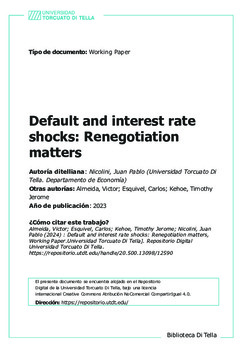Default and interest rate shocks: Renegotiation matters
Metadatos:
Mostrar el registro completo del ítemAutor/es:
Nicolini, Juan Pablo
Almeida, Victor
Esquivel, Carlos
Kehoe, Timothy Jerome
Fecha:
2023Resumen
We develop a sovereign default model with endogenous re-entry to financial markets via
debt renegotiation. We use this model to evaluate how shocks to risk-free interest rates trigger
default episodes through two channels: borrowing costs and expected renegotiation terms after
default. The first channel makes repayment less attractive when risk-free interest rates are high
due to higher borrowing costs. The second channel works through the expected subsequent
renegotiation process: when risk-free rates are high, lenders are willing to accept a higher
haircut in exchange for resuming payments. Thus, high risk-free rates imply better renegotiation
terms for a borrower, making default more attractive ex-ante. We calibrate the model
to study the 1982 Mexican default, which was preceded by a drastic increase in federal funds
rates in the US. We find that the renegotiation process is key for reconciling the model to the
widespread narrative that the increase in US interest rates triggered the 1982 default episode.
URI:
https://repositorio.utdt.edu/handle/20.500.13098/12590https://www.econstor.eu/handle/10419/284000
https://users.econ.umn.edu/~tkehoe/papers/DefaultAndInterestRateShocks.pdf

